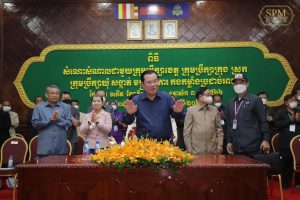In July, Al Jazeera broadcast a powerful documentary about cyber-scam human trafficking operations in Cambodia. It was a moving, if at times difficult watch, with victims speaking about how they had been lured to Cambodia with the promise of jobs, before being trapped inside compounds and threatened, beaten and electrocuted.
“I was scared [they’d kill me],” said one victim.
Although not the first media outlet to report on the issue, the Al Jazeera documentary placed considerable attention on it, and likely inspired other publications to focus on the issue, with articles run in outlets ranging from the BBC to The Guardian and VICE.
The global coverage has meant the issue has reached the very top of Cambodia’s government, with Prime Minister Hun Sen addressing the issue at a recent event on human trafficking. He told the audience at the 6th Interfaith Forum Against Human Trafficking: “Do not let Cambodia become a haven for crime, a place of money laundering, a place of human trafficking.” He added that he was surprised by the number of foreign nationals who had been brought to Cambodia and “cheated,” and urged authorities to take action.
Clearly, the issue of widespread human trafficking in Cambodia is an embarrassment to Hun Sen and his government, but it cannot have come as a surprise.
After all, as the Al Jazeera documentary points out, many of the compounds where these human rights abuses are taking place are owned by close allies of Hun Sen, including his nephew Hun To, as well as a former advisor, a senator from his Cambodian People’s Party (CPP), and an associate who flew Hun Sen to the United Nations in New York on a luxury private jet.
In fact, corrupt practices – whether human trafficking, deforestation, land confiscation, or many other issues – have been rife in Cambodia under the watch of Hun Sen, who has ruled the country since 1985. In 2005, a World Bank representative said Cambodia faced three major challenges: “corruption, corruption, corruption.”
The situation has not improved since then.
In its annual Corruption Perceptions Index for 2021, Transparency International gave Cambodia a score of 21 out of 100, ranking it 157th of the 180 countries assessed, and the third lowest in the Asia-Pacific, behind only Afghanistan and North Korea. Cambodia was given the lowest spot in Southeast Asia, a region not exactly renowned for its commitment to tackling corruption.
Donor countries must not be fooled by Hun Sen’s remarks that he knows nothing of the human trafficking taking place in Cambodia; in fact, it is ludicrous for him to say so. Over the years Hun Sen – a former Khmer Rouge soldier who became the country’s new leader as it emerged from decades of civil war and strife – has proven himself to be a wily operator when it comes to donor countries, attracting funds to tackle issues that are in fact being exacerbated by his corrupt form of governance, where kick-backs in the form of land, large-scale projects, or senior positions in conglomerates are granted to his supporters.
Last year, the United States ended an aid program aimed at protecting the Prey Lang Wildlife Sanctuary in northern Cambodia, saying the government had not done enough to tackle deforestation and was harassing environmental activists.
“The government continues to silence and target local communities and their civil society partners who are justifiably concerned about the loss of their natural resources,” the U.S. said. Washington had spent more than $100 million on the issue, funds that would be much better spent on supporting civil society and local efforts.
Donor countries must apply the same logic when it comes to cyber-crime and human trafficking, and recognize that while Hun Sen has the means to tackle such an issue, he lacks the will to do so. In fact, he is directly complicit, through the corrupt system of patronage that he oversees.
Hun Sen’s most recent comments, and the arrests made by police of some of those involved in human trafficking scams, are not the actions taken by authorities attempting to solve the problem, but are instead lip service paid to the international community following the embarrassing media coverage.
As the results of June’s commune-level election show – when the opposition, the Candlelight Party, received almost a quarter of the popular vote – there are still many people in Cambodia striving for freedom, democracy, and human rights.
Instead of offering support to a system that supports Hun Sen’s corrupt rule, donor countries should instead invest in civil society representatives and grassroots groups, and ensure their funds are spent on supporting those working for positive change in Cambodia.

































